
| Formerly a blacksmith's shop in Bristol U.K., the Douglas
Engineering Company owned by brothers William and Edward Douglas began
producing motorcycles in 1907.
Based on a horizontally opposed twin cylinder design, their engines gradually increased in size and power through to 500c and 600cc models fitted to the DT5 and DT6 Dirt Track models of the late 1920's and early 1930's. |
| During the 1920's, speedway and dirt track
racing had begun to grow in popularity.
Australian riders, promoters and engineers featured prominently in this growth and the success of the Douglas dirt track machines. |
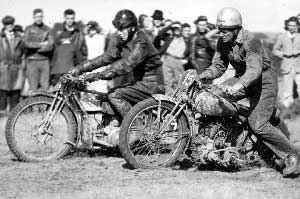 |
| Some of these Australians were Billy Conoulty,
Charlie Datson, Vic Huxley, Paddy Dean, Stewie St.George, Buzz Hibberd,
Billy Galloway, Keith McKay, Les Bailey and A J Hunting.
Initially, most riders rode a standard model production Douglas, the 1923 RA model. It was called the RA model due to the "Research Association" brakes - an early form of disc brake. They would often ride it to the meeting fitted as a road bike, then strip it for the race. |
| With its low centre of gravity, good power output, ease of steering and sliding, the Douglas was an outstanding machine for this kind of racing. | 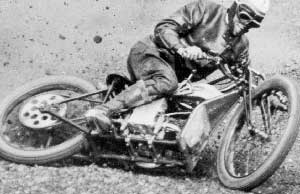 |
| Later, a special dirt-track machine was built with a frame built from the front section of the RA machine and the back section of another model called the "OC". This frame was very successful and continued to be the basis of the dirt track models into the 1930's. |
| A unique design feature of this frame was the "swan neck" which lowered the center of gravity, yet allowed quite large 28" diameter wheels to be fitted. Described as "looking fast even when it was standing still", the Douglas was possibly the first machine built specifically for dirt track racing. |
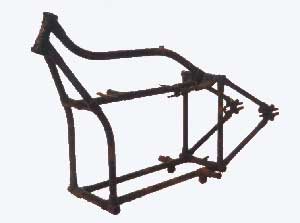 |
| The engine was a 499cc long stroke (62.25 x 82mm) design with overhead valves operated by tubular steel pushrods from the single ball race mounted cam. The small, yet very rigid crankshaft was a particularly unique design and a Douglas trademark. Forged in one-piece, it ran on ball races and featured detachable balance weights allowing the con rods to be fitted over the ends. |
| The cylinder heads were hemispherical with large diameter valves and highly polished ports. The twin 15/l6in racing Amac carburettors drew air through a screened air box on the offside of the machine. The wheelbase was kept as short as possible by mounting the engine longitudinally in the frame. |
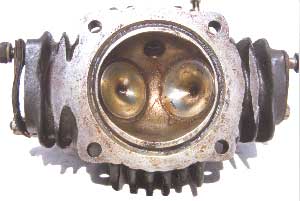 |
| For almost three years, the Dirt Track Douglas was the supreme dirt track machine selling around 1200 in 1929 alone. |
| It was at about this time that Alex Kynoch
discovered the joy of riding and racing Douglas motorcycles. He began racing
them in scrambles and other dirt track events around Melbourne, Australia
in 1930.
Racing successfully for 10 years, he built up a stable of Douglas machines rebuilding and tuning them in his garage in St Kilda, Melbourne. |
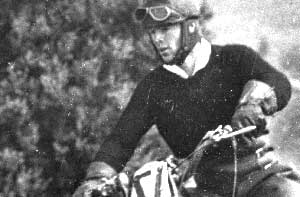 |
| Before leaving the racing world to join the
Royal Australian Air Force, he disassembled and packed away all his Douglas
machines. Now, sixty years later, this valuable collection of Douglas motorcycle
parts is available for sale. You can find photographs of all the parts, racing pictures and buying information at: kynoch-douglas-parts.com |
Sheldon's EMU: Douglas Motorcycles
For Sale: Philip Vincent Collection
Site by ManxNorton.com 